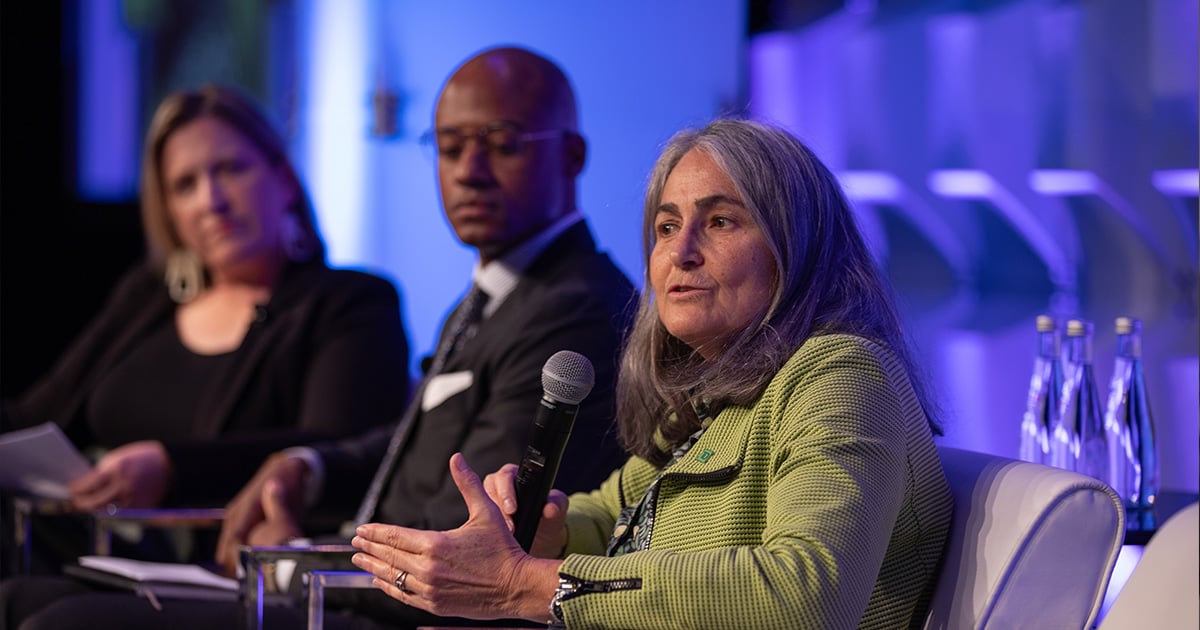
Safe spaces, centering your “why,” speaking up, and building heroes that create inclusive workplaces.
On the 2023 Catalyst Honours main stage, Dr. Julie Cafley, Executive Director, Canada, reported a troubling statistic from Catalyst research: 75% of employees perceive that their organization’s DEI policies regarding racial equity are not genuine.
At a time of rising anti-2SLGBTQ+ demonstrations and violence in North America, as reported by ACLED, performative DEI policies risk alienating their employees and allowing bias to go unchallenged in the broader Canadian cultural conversation.
In the conference session “From Flags to Fulfillment: Failing Forward on 2SLGBTQ+ Workplace Inclusion to Advance Concrete Change,” Cafley moderated a conversation with 2SLGBTQ+ advocates David Simmonds, SVP, Global Chief Communications and Sustainability Officer, Canada Life and Amy Hanen, AVP, Sustainability and Corporate Citizenship, TD Bank Group.
Together, the panel explored how organizations can move beyond performative allyship to take action that drives meaningful inclusion and belonging for 2SLGBTQ+ employees.
Here are some key takeaways from the session:
Create Psychologically Safe and Courageous Spaces
Employers need to create work cultures that are safe for people to bring their authentic selves while also making space for people to learn from their mistakes, Simmonds said.
“When [Canada Life] talks about innovation, we put failure as a key requirement,” he said. “We talk about learning lessons from failures. The challenge in DEI work is that the margin of error is often on [marginalized] people… We must accept that at no point is hurting individuals appropriate, but we must invite people to a space where we build a better culture.”
Simmonds cautioned companies from expecting 2SLGBTQ+ and other employees from non-dominant groups to bring more of themselves to professional settings than they desired.
“Bring as much of yourself to work that unlocks your potential and drives the business forward,” he suggested as an invitation. Employees should have the agency to adapt how they show up and contribute to the organization.
Weather-Proof Your DEI Commitments With Your “Why”
According to Hanen, a company must be clear about its “why” to move beyond performative allyship to genuine commitment, finding its “swim lane.”
“[At TD Bank], the two things we keep in mind are: First, what’s our ‘why’? For us, our ‘why’ is creating safe and inclusive spaces for our employees. And that informs where we take our positions,” said Hanen. “And second, we must be prepared for backlash. You expect it. You know it’s coming. And so, you’re prepared to deal with that.”
The substance of an organization’s commitment doesn’t change because of external criticism if you stay grounded in your purpose. “Allyship is an expression of values,” Hanen explained.
In today’s world of 2SLGBTQ+ advocacy, “we have an embarrassment of rich resources around us that can tell us how to be better allies,” said Hanen. “The downside of that is that it can lead to performativity, what to do rather than why.”
“As we look forward, what the lessons of history tell us is that we have to remember that people have to learn how and why to care, not just how and why to act,” she concluded.
Don’t Be Quiet in Times of Backlash
During this cultural moment of pushback against the 2SLGBTQ+ community, both panelists agreed: make some noise.
“As soon as things like this start to happen, our employees wonder, are we still with them?” said Hanen. “The first thing organizations need to do is reaffirm their unwavering commitment.”
Bringing in a historical perspective, Hanen explained how the early 2SLGBTQ+ movement benefitted from the fact that most people realized they had a gay or lesbian person in their lives. But with today’s backlash against the smaller transgender and gender nonconforming (TGNC) population, there’s a greater need for allies to amplify and platform the stories and lived experiences of TGNC colleagues.
Simmonds added: “I don’t think the majority of society wants to do things that are negative to their neighbors, loved ones, and friends.”
However, “there is a mythology developing that’s untrue, not grounded in fact, and is damaging,” he said. “So, if you have the ability or platform to speak up, to lend your voice, I challenge you to do that because that’s the only way we deconstruct what’s happening on the other side of the argument.”
Make Heroes, Not Bullies or Bystanders
Companies can better ground themselves in this work by asking one question: “How do you build heroes, not bullies and bystanders?”
Simmonds concluded the session by referencing The Bully, the Bullied, and the Bystander by Barbara Coloroso, which describes how parents teach their kids to be one of those three things.
“How do we [teach our kids to be heroes]?” asked Simmonds. “We teach [them] to care deeply, to share willingly, and to give generously. And often, when I have conversations about uncomfortable realities of identity, I say, if you can anchor it back into those three things, you’re a better leader and manager.”
Discover more insights from 2023 Catalyst Honours
Sign up to receive reminders for upcoming webinars, roundtables, and conferences.




![What Is An Alternative Education Program? Preparing Students For The Future [2024 DEI Resources]](https://diversity.social/wp-content/uploads/2023/01/Best-employers-for-Family-friendly-diversity-certification.png)
